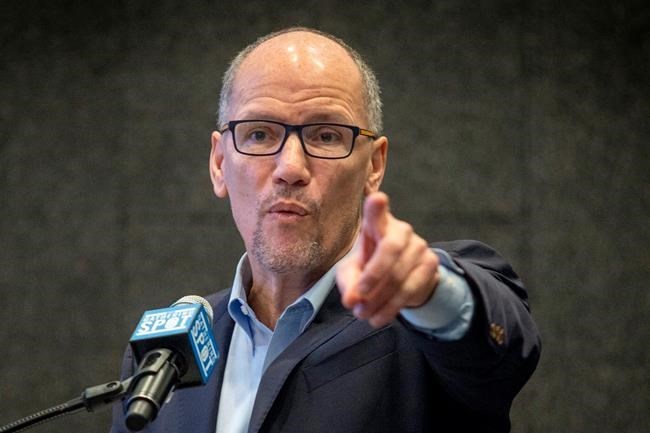
FILE - In this Nov. 20, 2019 file photo, Tom Perez, chair of the Democratic National Committee, addresses the audience during a speech in Atlanta. Perez said Monday that the handful of 2020 presidential caucuses should be the last the party ever holds. He didn’t specifically name Iowa, which for decades has led off the nominating calendar, but his position would represent a seismic shift in the party’s traditions. (AP Photo/ Ron Harris)
Republished August 17, 2020 - 5:18 PM
Original Publication Date August 17, 2020 - 2:51 PM
Democratic National Committee Chair Tom Perez said Monday that this year's handful of presidential caucuses should be the last the party ever holds.
“I think by 2024 we ought to have everyone being a primary state,” Perez told The Associated Press in an interview on the opening day of the Democratic National Convention.
The chairman didn’t specifically name Iowa, which for decades has led off the nominating calendar, but his position could represent a seismic shift in the party’s traditions, and it underscores the pressure on the caucus structure that has intensified since Iowa’s count dragged out for days to open the 2020 nominating fight eventually won by Joe Biden.
Perez’s term as chair will end before the 2024 nominating order of states is determined. But he said he plans to “use the bully pulpit as a former chair to make sure we continue the progress” of changes after the bitter 2016 primary fight between nominee Hillary Clinton and runner-up Bernie Sanders.
One anchor provision of that overhaul barred superdelegates — DNC members, top elected officials, party luminaries like former presidents and vice-presidents — from having a presidential vote on a first ballot of a contested convention. The other major shift pushed states toward an open primary process.
Delegates to Democrats’ all-virtual convention this week already have cast remote votes on whether to extend all the changes through 2024. Perez said that should pass overwhelmingly.
The chair added that the point of those changes was to expand rank-and-file voters’ influence in the party, including by increasing voter turnout during the nominating process. “I want everyone to participate, and having a state-run primary is the best way to accomplish that,” he said.
In primaries, like general elections, voters cast their ballots privately at in-person precincts or by absentee ballot. Some state parties limit participation to registered party members; others also welcome independents. Caucuses are more restrictive. Even if they are effectively opened with same-day party registration, they are in-person gatherings that can last several hours, with voters choosing sides publicly.
While the party changes coming out of 2016 did not force states to abandon caucuses altogether, they required any state keeping its caucus to create a paper trail for the voting process. Iowa and about a half-dozen other states and territories agreed to those changes, while another group of states retired their caucuses and moved to primaries. But Iowa’s choice proved chaotic when state party leaders and the national party had to spend days counting and recounting. Because of the irregularities, the AP decided against declaring a winner.
Iowa’s first-in-the-nation caucuses, as well as New Hampshire’s first-in-the-nation primary a week later, have held their vaunted slots on the argument that the small states allow candidates without a national profile and massive fundraising base to have a shot at the presidency, at least theoretically. But their status is further threatened in the Democratic pecking order because the states are overwhelmingly white, while the national party is much more diverse.
That gap was underscored this year when Biden finished fourth in Iowa and fifth in New Hampshire, only to dominate the contest over the ensuing months once more diverse states held their primaries. He won 10 of 14 Super Tuesday primaries with a coalition of Black voters, older white voters and white moderates from larger cities and suburbs.
Perez wouldn’t comment on whether he thinks Iowa or New Hampshire should give up or share their lead spots, saying the party must focus energy on helping Biden and other Democrats win in November.
But Perez said the effort to further reshape the nominating process “will hopefully begin … before I leave” after the November election, even though it will have to be finished “by my successors.” And the matter of demographics in both individual states and the larger Democratic electorate, he said, “undoubtedly will come up.”
If Biden wins, he would have a strong say in the matter, given the tradition that incumbent presidents tap the DNC chair, who operates largely in concert with the White House political office. DNC members chose Perez in an open election weeks after President Donald Trump's inauguration in 2017, leaving him to shepherd the overhaul process.
News from © The Associated Press, 2020